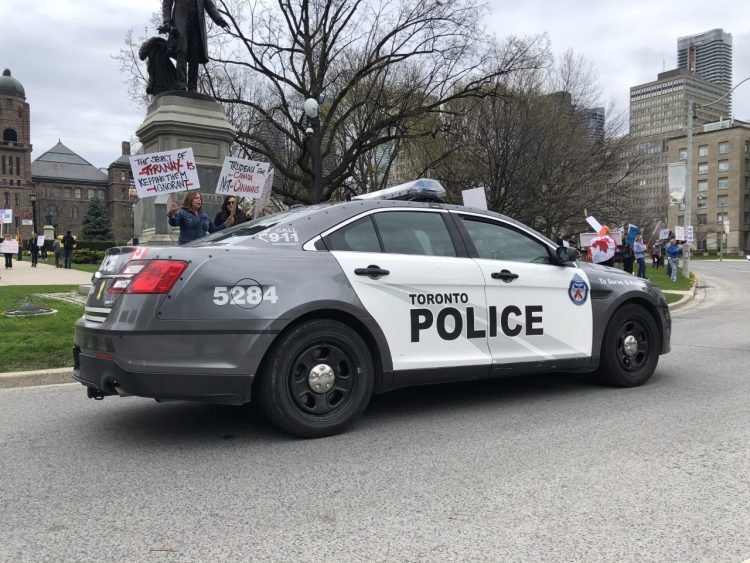In an email statement to CityNews, Toronto Police say while there has been “no identified threat to public safety,” it says it will continue to monitor security issues “not just in Toronto, but around the world, to mitigate the potential risks to public safety.”
“The TPS will have uniformed police officers on patrol throughout the downtown area on Wednesday,” they said.
In a letter sent out on Wednesday, the Legislative Protection Service at Queen’s Park also said security measures are being put in place out of an “abundance of caution.”
It says the increases will be in “police and security presence in the city and Queen’s Park” specifically, citing the recent events in Washington coupled with the Inauguration.
Small rallies broke out in front of the U.S. Consulate in downtown Toronto to show support for President Donald Trump on the day of rioters stormed the U.S. Capitol.
Biden will be sworn in as the 46th President of the United States under unprecedented security measures in Washington.
There are still security concerns after a mob of Trump supporters stormed the U.S. Capitol on January 6.
Washington’s city centre is essentially on lockdown with streets blocked, high fencing installed and tens of thousands of National Guard and other law enforcement officers stationed around the area.
Secret Service has also increased security in and around the Capitol a week early in preparation.
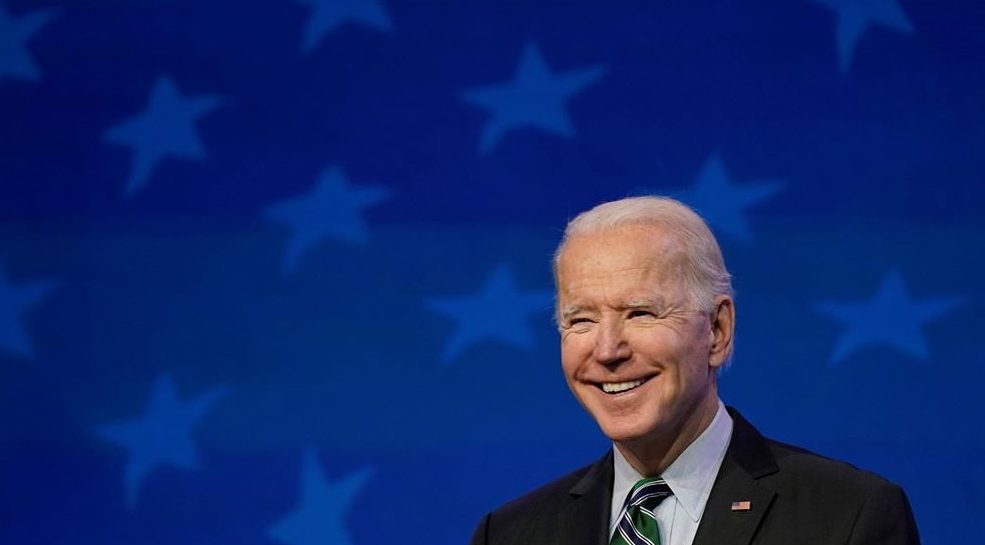
Joe Biden will be sworn in as the 46th President of the United States on the steps of the U.S. Capitol building on Wednesday.
Biden beat out Donald Trump in a highly contested election which saw the rifts between Democrat and Republican supporters deepen. The outgoing president falsely claimed he had won the election and then launched legal challenges against the results. Earlier this month Trump supporters stormed the Capitol building in protest.
Trump has said he will not be attending the inauguration but vice-president Mike Pence, along with other former U.S. presidents, will be in attendance.
Wednesday’s inauguration is expected to have a much less dramatic feel and will include a performance of the Star-Spangled Banner by Lady Gaga.
The ceremony is scheduled to start at 11:30 a.m., with the Oath of Office scheduled to be taken at noon.
The entire ceremony will be streamed live on this website.
Aides say that Biden’s first event in Washington, along with Vice-President-elect Kamala Harris, will be to take part in an evening ceremony at the Reflecting Pool near the Lincoln Memorial to honour the nearly 400,000 American lives lost to COVID-19.
Harris will make history when she officially becomes the first woman to hold the position of Vice President of the United States tomorrow.
Aides say Biden will use Wednesday’s inaugural address — one that will be delivered in front of an unusually small in-person group because of virus protocols and security concerns — to call for American unity. To that end, he extended invitations to Congress’ top four Republican and Democratic leaders to attend Mass with him at St. Matthew’s Cathedral ahead of the inauguration ceremony.
The Democratic president-elect has talked throughout the campaign and the post-election period about his goal of uniting a sharply divided country.
The inauguration is also expected to celebrate the resiliency of Black Americans.
The event is expected to have heightened security, as well as enhanced COVID-19 measures.
Biden plans to issue a series of executive orders on Day One — including reversing President Donald Trump’s effort to leave the Paris climate accord, cancelling his travel ban on visitors from several predominantly Muslim countries, and extending pandemic-era limits on evictions and student loan payments.
With files from Bill Barrow And Aamer Madhani of The Associated Press

Some feel big box stores have an unfair advantage by being allowed to stay open during the province-wide COVID-19 lockdown, but they aren’t receiving any preferential treatment by police and bylaw officers in York Region.
Five Walmart locations and a Costco in York Region are among a slew of businesses fined over the last week for COVID-19 violations like improper mask use by employees, lack of cleaning and disinfecting and failure to physically distance at check-out lines.
Each offence carries a fine of $880.
In total, 1,928 inspections took place between Jan. 11 and Jan. 17, with 45 charges laid.
Five Shoppers Drug Mart locations were also hit with fines for “self-checkout not sanitized for use.”
Several grocery stores were also cited. They include Food Basics, FreshCo, No Frills and Sobeys.
The full list can be found here.
The region notes that most businesses are complying with the rules but warns the offenders that further action could be taken if they don’t shape up.
“Businesses failing to keep their customers and employees safe by not adhering to the mandated COVID-19 safety measures will be subject to fines. Repeat offenders could face temporary closure,” York Region said in a release.
The province reported 235 new cases of COVID-19 in York Region on Tuesday. It remains one of the virus hotspots, along with Toronto, Peel Region and Windsor-Essex.
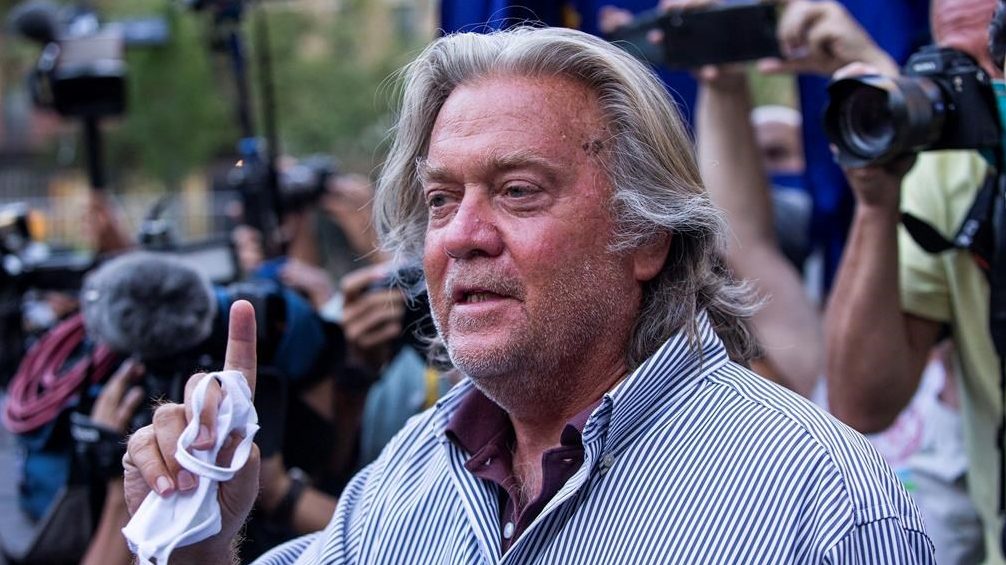
President Donald Trump pardoned former chief strategist Steve Bannon as part of a flurry of clemency action in the final hours of his White House term that benefited more than 140 people, including rap performers, ex-members of Congress and other allies of him and his family.
The last-minute clemency, announced Wednesday morning, follows separate waves of pardons over the past month for Trump associates convicted in the FBI’s Russia investigation as well as for the father of his son-in-law. Taken together, the actions underscore the president’s willingness, all the way through his four years in the White House, to flex his constitutional powers in ways that defy convention and explicitly aid his friends and supporters.
To be sure, the latest list was heavily populated by more conventional candidates whose cases had been championed by criminal justice activists. One man who has spent nearly 24 years in prison on drug and weapons charges but had shown exemplary behaviour behind bars had his sentence commuted, as did a former Marine sentenced in 2000 in connection with a cocaine conviction.
But the names of prominent Trump allies nonetheless stood out.
Besides Bannon, other pardon recipients included Elliott Broidy, a Republican fundraiser who pleaded guilty last fall in a scheme to lobby the Trump administration to drop an investigation into the looting of a Malaysian wealth fund, and Ken Kurson, a friend of Trump son-in-law Jared Kushner who was charged last October with cyberstalking during a heated divorce.
Bannon’s pardon was especially notable given that the prosecution was still in its early stages and any trial was months away. Whereas pardon recipients are conventionally thought of as defendants who have faced justice, often by having served at least some prison time, the pardon nullifies the prosecution and effectively eliminates any prospect for punishment.
“Steve Bannon is getting a pardon from Trump after defrauding Trump’s own supporters into paying for a wall that Trump promised Mexico would pay for,” Democratic Rep. Adam Schiff said on Twitter. “And if that all sounds crazy, that’s because it is. Thank God we have only 12 more hours of this den of thieves.”
And while other presidents have issued controversial pardons at the ends of their administration, perhaps no commander in chief has so enjoyed using the clemency authority to benefit not only friends and acquaintances but also celebrity defendants and those championed by allies.
Wednesday’s list includes its share of high-profile defendants. Among them were rappers Lil Wayne and Kodak Black, both convicted in Florida on weapons charges. Wayne, whose real name is Dwayne Michael Carter, has frequently expressed support for Trump and recently met with the president on criminal justice issues. Others on the list included Death Row Records co-founder Michael Harris and New York art dealer and collector Hillel Nahmad.
Other pardon recipients include former Rep. Rick Renzi, an Arizona Republican who served three years for corruption, money laundering and other charges, and former Rep. Duke Cunningham of California, who was convicted of accepting $2.4 million in bribes from defence contractors. Cunningham, who was released from prison in 2013, received a conditional pardon.
Trump also commuted the prison sentence of former Detroit Mayor Kwame Kilpatrick, who has served about seven years behind bars for a racketeering and bribery scheme.
Bannon has been charged with duping thousands of donors who believed their money would be used to fulfil Trump’s chief campaign promise to build a wall along the southern border. Instead, he allegedly diverted over a million dollars, paying a salary to one campaign official and personal expenses for himself.
Bannon did not respond to questions Tuesday.
The City of Toronto’s COVID-19 mass immunization clinic which opened Monday at the Metro Toronto Convention Centre, despite recently announced delays in delivery of the Pfizer vaccine, will have to pause operations on Friday.
The clinic is for those designated by the province as next in line for the vaccine, including frontline healthcare workers in the shelter system and public health workers who will then work as COVID-19 immunizers.
It was to run for at least six weeks, seven days a week from 11 a.m. to 8 p.m. However, in the city’s daily COVID-19 briefing, officials said it will have to pause due to a shortage of the Pfizer vaccine.
“The fact that we learned today that we are going to have to pause only after the first week is very disappointing to all of us,” Toronto fire chief Matthew Pegg said.
The city said this clinic will help test the setup in non-hospital settings, providing a playbook that the province can use to establish other immunization clinics when the vaccine becomes available to the general public.
“I see today as being something that should give people hope for a number of reasons,” said Mayor John Tory. “We are doing something here that will be of benefit provincewide. The lessons learned here …those lessons will shared across the province.”
Pegg added that though health officials will only have limited data due to the pause in operations, he is confident it will still be enough to help guide that playbook, which will be released to help residents better understand the nuance of getting vaccinated.
“The playbook will not need to pause. We will continue with that work,” Pegg said. “Somewhat of a work in progress. Somewhat of a decision that needs to be made in accordance with Gen. Hillier’s team.”
Toronto’s top doctor, Eileen de Villa, said she understands that most residents wish to be vaccinated rapidly but asked that everyone be patient as the process continues.
“Be patient, be optimistic and let me add, be determined,” de Villa said.
“As vaccines arrive, we still have to protect ourselves against COVID-19. With those efforts, the case counts will decline. In Toronto, we’re already seeing signs that we ourselves are the best defense against the spread of the virus.”
Pegg confirmed that a small group of City health care workers was vaccinated against the virus earlier Monday morning.
On Saturday the province adjusted the guidelines for the second dose after Pfizer announced it is temporarily reducing deliveries from its European facility to all countries receiving its vaccine, including Canada. Pfizer’s production delays will reduce deliveries by an average of 50 per cent over the coming weeks.
Ontario’s Chief Medical Officer of Health, Dr. David Williams, says as a result some recipients of the vaccine will now get their second shot between 21 and 42 days after the first dose. Long-term care residents along with their essential caregivers and staff who have already received the first dose will now get the second dose in 21 to 27 days.
The initial goal of the clinic was to administer 250 doses per day for three weeks with the second dose scheduled for the same people three weeks later, however, officials note that schedule is based entirely on vaccine supply.
The first vaccine vial emptied on Monday will be kept as a piece of history and added to the City of Toronto artifact collection.
“This is going to be great, it’s going to be a pilot project we can expand across the province,” said Premier Doug Ford.
The clinic was scheduled to administer the Moderna COVID-19 vaccine, but due to the supply issues with the Pfizer vaccine, the clinic’s doses may be reallocated elsewhere by the province as required.
City council and the Board of Health is also going to ask the Ford government on Monday to require employers to provide at least five paid sick days a year to workers, as well as funding for businesses so workers can have at least 10 days of sick pay annually if an infectious disease emergency is declared.
https://toronto.citynews.ca/2021/01/17/city-set-to-open-mass-immunization-clinic-at-convention-centre-on-monday/
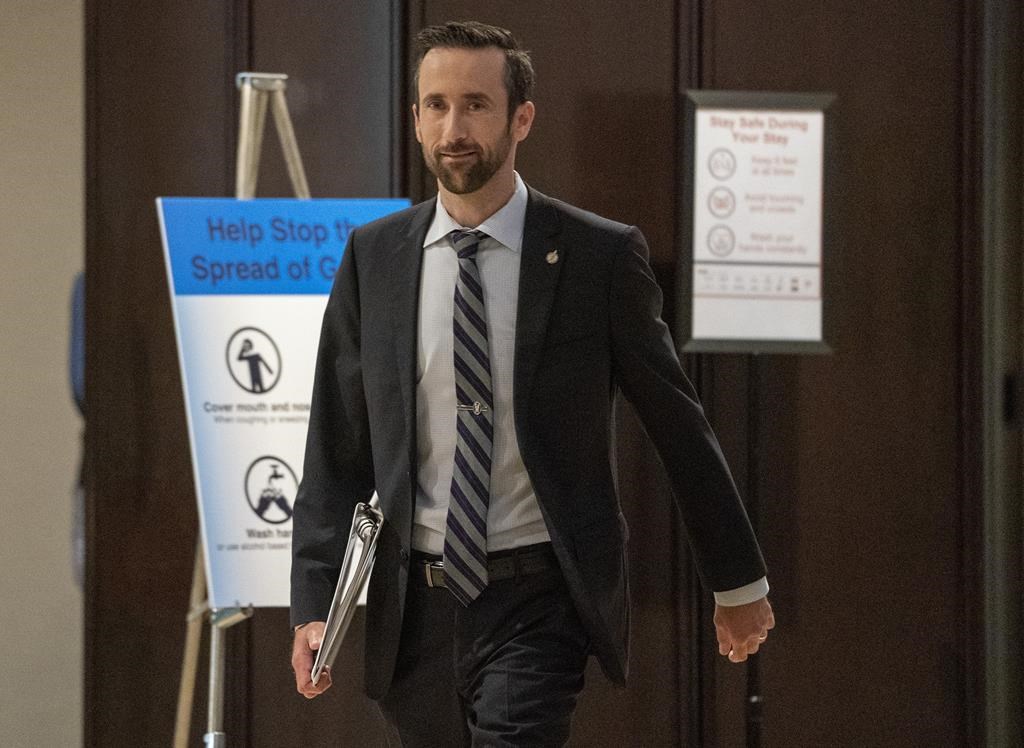
OTTAWA — Conservative Leader Erin O’Toole says he wants Ontario MP Derek Sloan kicked out of the party caucus over a donation to his leadership campaign from a white supremacist.
In a statement Monday evening, O’Toole said accepting the contribution is “far worse than a gross error of judgment or failure of due diligence” by his former leadership rival.
It’s up to Conservative MPs whether to eject Sloan from their number, but O’Toole said he’ll use his power as party leader to ban him from running as a Tory in the next election.
“Racism is a disease of the soul, repugnant to our core values. It has no place in our country. It has no place in the Conservative Party of Canada. I won’t tolerate it,” O’Toole said in the statement, issued less than three hours after word of Sloan’s donation emerged.
Sloan has already been nominated to run again as the party’s candidate in the Ontario riding of Hastings-Lennox and Addington.
He said Monday his leadership team processed the $131 donation from Paul Fromm without recognizing his name among thousands of other donors.
Fromm has been a fixture in right-wing politics for decades, including participating in events with the neo-Nazi Heritage Front.
Sloan said when he learned about the donation Monday afternoon, following a report by the website PressProgress, he contacted the Conservative party and asked that Fromm’s money be returned.
During the leadership race, Sloan was accused of racism for comments he made about the country’s chief public health officer and a move was launched within caucus to expel him.
At the time, O’Toole stood up for him and shut down the efforts to get him removed.
The leader’s move Monday came the day after he’d issued a statement saying there’s no room for right-wing extremism in the party he leads _ and as moderate and more rock-ribbed elements in the party prepare for a showdown at a policy convention scheduled for March.
O’Toole’s statement laid out steps he’s personally taken to showcase a party that bears zero resemblance to the right-wing extremism on display in the United States in the aftermath of the presidential election.
With the inauguration of president-elect Joe Biden this week, and the potential for renewed violence in the U.S., a line needed to be drawn that the party doesn’t tolerate the “far right,” O’Toole’s office said.
But when asked what that would mean in practice, or for the convention, his staff didn’t answer.
For example, his office said last week it will no longer grant interviews to the provocative right-wing organization The Rebel, but wouldn’t say whether that ban would extend to all. At least one MP has granted them an interview since then.
The Rebel took a direct swipe Monday at O’Toole, accusing him of ignoring the base of the party.
“Hey (Erin O’Toole),” wrote The Rebel’s Keean Bexte in response to an O’Toole tweet about American civil rights activist Martin Luther King Jr.
“I know you are busy virtue signalling about a foreign activist from the last century — but right now in your country, gun owners (your base — for now) are in court fighting tooth and nail to stop that politician you’re paid to oppose.”
The people who form the base of the party, which does include gun-rights advocates, are also those who will show up in force at the convention.
It’s a venue where O’Toole can set the tone, said former party strategist Tim Powers. “He’s going to want to use that to showcase modernity.”
Issues so far advanced for potential debate include medical assistance in dying, religious freedoms, the rights of parents to raise their kids free of government or institutional interference and ending the use of most temporary foreign workers.
A concerted effort to register delegates is also being made by those seeking to delete the party’s official line that a Conservative government would not support any legislation to regulate abortion.
“Sick of hearing Conservative politicians say they ‘won’t reopen the abortion debate?’ Then change it,” the group Right Now told its supporters.
“Register to become a delegate at the upcoming online policy convention and vote to remove that line from the policy handbook.”
O’Toole’s leadership victory was strongly tied to the supporters of two other candidates in the contest: Leslyn Lewis, and Sloan himself.
Their committed backers were social conservatives who ultimately handed O’Toole his win, and O’Toole’s desire for their support was understood to be one reason he’d pushed back against the earlier attempt to kick Sloan out of caucus.
Earlier this month, Sloan reached out to his own supporters, urging them to sign up for the convention.
“We need as many truly ‘conservative’ delegates to participate as possible. The more ‘conservative’ delegates who participate, the more success we will have in making the (Conservative Party of Canada) into a truly conservative party,” Sloan wrote in an email to his supporters.
At the 2018 convention, social conservatives lost their bid to remove the party’s policy on abortion. They say if they could have marshalled just 106 more delegates, it would have passed.
Party leaders don’t normally have transparent control over what policy resolutions go up for debate. It’s a complicated system that includes member votes, regional representation and the ultimate green-light by party officials.
But previous Conservative leaders have been accused of placing pressure on those officials to structure debates such that time runs out before certain ideas can be discussed.
Those allegations saw O’Toole promise during his leadership bid that all ideas that make it to the convention will have a chance to be heard and voted on.
“Let’s embrace our grassroots, not run from it,” he said in his platform.
Whether he stands by that pledge is unclear. His office directed questions on the subject to the party, which did not immediately return a request for comment.
This report by The Canadian Press was first published Jan. 18, 2021.
— with files from Lee Berthiaume
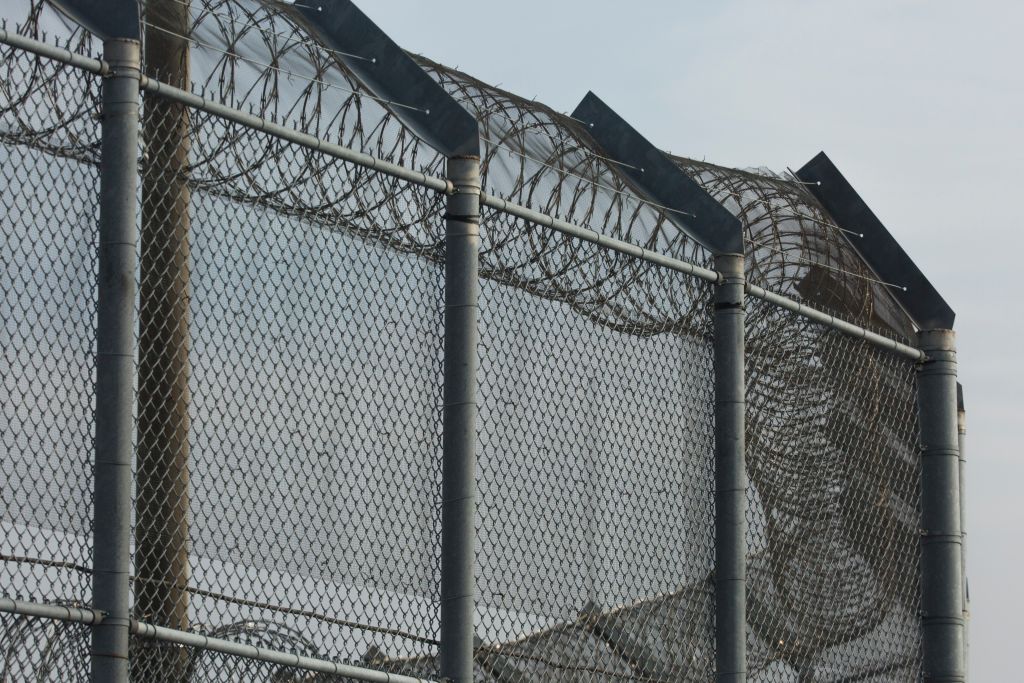
Several staff members and inmates at the Maplehurst Correctional Complex in Milton tested positive for COVID-19 over the weekend, sources tell CityNews.
So far, seven inmates and seven staff have been infected. Approximately 240 inmates are in temporary isolation to prevent further spread.
Sources say two or three staff members were also sent home Monday as they were showing symptoms of the virus.
When inmates first arrive at the complex, their intake unit is placed in isolation for 14 days as per COVID-19 safety protocols, before being released into the general population.
However, the cases identified over the weekend were found within the general population.
“For inmates to start testing positive when they are no longer in the 14 day intake unit is very concerning,” says Peter Figliola, president of OPSEU Local 234, the union that represents staff at the facility. “Once the virus enters the institution, and we’ve said this from day one, we would have a very difficult time controlling it.”
Figliola says staff has asked for transparency and to be involved in the contact tracing process at the facility multiple times, but they have not been consulted. He says contact tracing at the complex is done solely by the Ministry of the Solicitor General.
“At the end of the day, officers feel like they are being left in the dark and have lost faith in the contact tracing process,” says Figliola, adding that he’s proud of the people who work at the facility despite a lack of transparency.
“They show up for work everyday and are walking into the unknown,” he said.
More to come
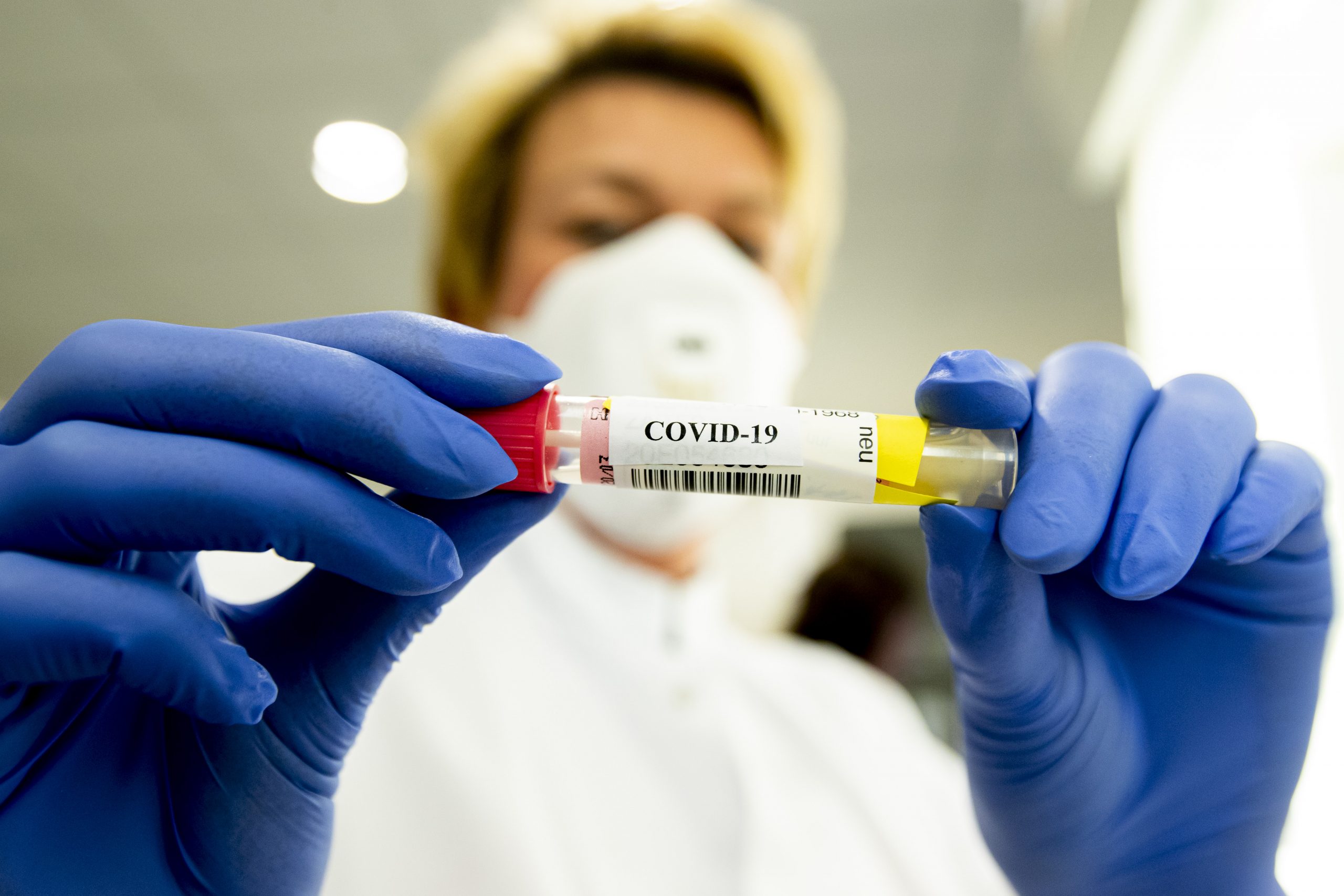
There was rare optimism in Ontario’s fight against COVID-19 Monday, as the chief medical officer of health said there are early signs the Boxing Day lockdown is working.
Dr. David Williams said daily cases have plateaued to the 3,000 range and the percent of Ontarians testing positive is also dropping.
“It’s been a trend for one week so far,” said COVID-19 biostatistician Ryan Imgrund. “At least we can have some faith that it’s not just a one-day drop.”
Imgrund said the province’s reproductive value is below one. It’s another indication the lockdown we entered on Dec. 26th – not the stricter lockdown implemented last week – has so far been effective.
Now the challenge, Imgrund said, is keeping down the “R number,” which is how many secondary infections are caused by one primary infection.
“You really want to get that value significantly under one, and the more you can get that under one, the better it is,” he said.
Dr. Williams indicated he’ll consider lifting lockdown measures when cases drop to below 1,000.
“For us to get down to around 1,000 cases will probably take about six or seven weeks,” Imgrund said. “For instance, if you have that reproductive value down to 0.7 it actually means that in one month our 3,000 cases will actually go down to 300 cases.”
Over the past few months, Imgrund has watched the case numbers with alarm. He says banning gatherings and moving schools online are driving the decline.
But he cautions once schools reopen, COVID-19 will travel from one home to the next.
“We have to keep in mind that even though we may have a stringent lockdown in place,” he said, “once you send kids back to school, you will inevitably increase transmission.”
The Canadian Red Cross has been deployed to a long-term care home in Barrie after a massive COVID-19 outbreak.
Roberta Place Long Term Care home confirmed to CityNews that they have partnered with the charitable organization for support in their efforts to stop the ongoing outbreak.
“We are pleased and excited about the swift action and assistance demonstrated by the Canadian Red Cross and we look forward to continuing to collaborate with them,” said spokeswoman Stephanie Barber.
The facility is home to 122 residents and Barber said currently, 62 residents and 43 staff members have confirmed cases of COVID-19. Nine residents have died at the home as a result of the virus.
Barber added that a vaccination clinic was conducted at the home on Saturday, with 71 residents vaccinated. She did not confirm reports that the U.K variant of COVID-19 was responsible for the outbreak, but said further testing is underway.
In a news release on Sunday afternoon, Provincial NDP Leader Andrea Horwath called for the army and the Red Cross to be deployed to Roberta Place to help manage the crisis as earlier reports suggested nearly all residents and staff were infected.
Horwath also called on Premier Doug Ford to respond to the urgent situation at the facility and others across the province.
“We’re asking Doug Ford not to let these people continue to suffer without the province doing anything to ease their struggle and help save lives,” she said in the release.
Earlier this month, the St. George Care Community in Toronto was believed to be the worst hit in Ontario, reporting that 97 of their 140 residents were infected at some point during their outbreak. The facility, like Roberta Place, is a for-profit home.
Federal NDP Leader Jagmeet Singh has said it is time to end for-profit long-term care homes in Ontario.
He attended a rally outside St. George Care Community last weekend where he called on the federal government to be more proactive when it comes to COVID-19 outbreaks in homes — including deploying military help if necessary.
“We can’t just react when a problem occurs, we can’t just react when there’s an increase in infection rate, we have to be proactive,” he said at the time. “One of the key steps that everyone agrees [is] that profit is clearly resulting in horrible conditions for seniors and we can’t allow that to continue.”
According to provincial data, 246 of the 626 long-term care homes in Ontario are currently experiencing outbreaks of the virus.
https://toronto.citynews.ca/2021/01/17/ndp-calling-for-army-red-cross-help-after-all-residents-at-barrie-ltc-infected-with-covid-19/

True to form, Betty White has something impish to say about her birthday Sunday.
“Since I am turning 99, I can stay up as late as I want without asking permission!” she told The Associated Press in an email.
White’s low-key plans include feeding a pair of ducks that regularly visit her Los Angeles-area home. Her birthday meal will be a hot dog and French fries brought in – along with a bouquet of roses – by her longtime friend and agent, Jeff Witjas.
The actor’s TV credits stretch from 1949’s “Hollywood on Television” to a 2019 voice role in “Forky Asks a Question,” with “The Golden Girls” and “The Mary Tyler Moore Show” among the enduring highlights.
In January alone, White is on screen in reruns including “The Golden Girls” and “Hot in Cleveland”; the 2009 Sandra Bullock movie “The Proposal,” and the 2018 documentary “Betty White: First Lady of Television,” about her life and career.
White’s devotion to animals will be on display next month with the DVD and digital release of “Betty White’s Pet Set,” a 1970s series in which she visited with celebrity guests and their pets as well as wild animals.
Her work, always marked by top-drawer comedic timing, has earned her five Emmy Awards, including a 2010 trophy for a guest-host appearance on “Saturday Night Live.”
A native of Oak Park, Illinois, White was married to game show host and producer Allen Ludden from 1963 until his death in 1981.









